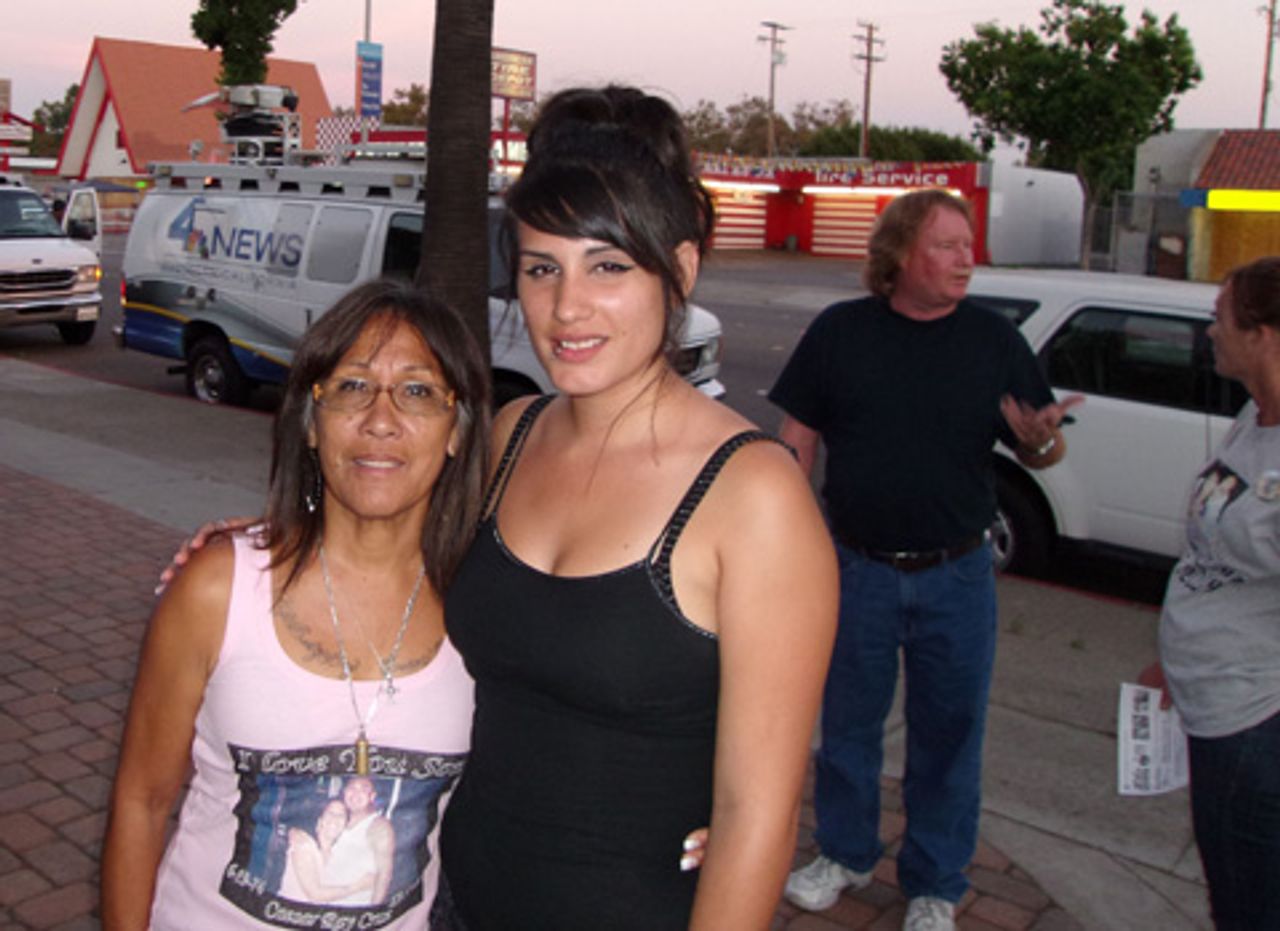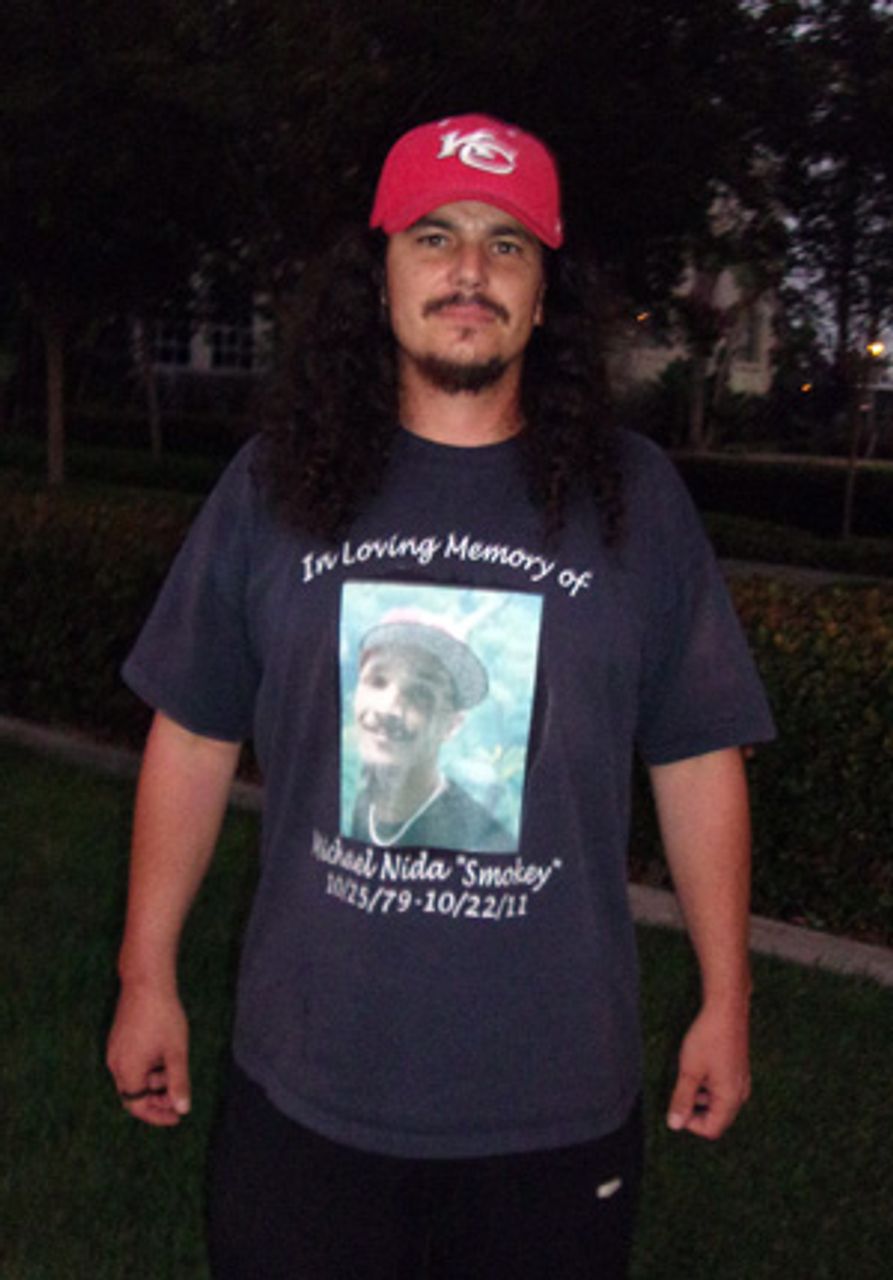WSWS reporters spoke to several members of the audience at the Anaheim city council meeting August 8, including relatives of those killed by police.
Theresa Smith has lived on and off in Anaheim for over 50 years. Her son, Caesar Cruz, killed by the Anaheim Police Department (APD) on December 11, 2009, was born in the city. The WSWS asked Theresa about the circumstances of Caesar’s death.
 Theresa and Sonia
Theresa and Sonia“All I know is that they got a phone call, they followed my son, he went into Wal-Mart right here in Anaheim … five police officers shot him.” When asked about the official explanation for the killing, she replied, “I don’t know. I don’t have one. It’s been almost three years, I still don’t have one.”
“I’ve been protesting out in front of Anaheim PD. My son died on a Friday, I was out there protesting on Sunday and I’ve been out there every Sunday. I had family members at first, but they dwindle off and other people saw me out there, and so other families that joined in, we are now the Anaheim Cruzaders.
“I started a grief support group and I’m starting a non-profit called LEAN, Law Enforcement Accountability Network. What that would consist of is having an oversight committee; I’ve been working on that for two years. Having other groups, other families, I have another family that I’m working with up north, because it’s happening nationwide. This isn’t just here. But we’re starting here.”
The WSWS asked Theresa to comment on the widespread police violence. She explained, “Unfortunately for us, the victims, the families of victims, the police kill people and there’s no accountability. It goes to the district attorney, and he justifies everything that’s been done. They’re also protected by their union.”
She went on: “We don’t have much to work with to try to get anything resolved … Things have to start changing, the policies inside the police department, this mentality that whoever they kill, they can get away with it because they’ve got a badge.
“The people that they’re killing are our loved ones, they are human beings. They’re our sons, they’re our brothers, they’re fathers, they’re nephews, they’re cousins and it devastates the entire makeup of the whole family. You know, if somebody is killed so violently like this and there are no answers, it’s not that you don’t move on, but it’s a horrible thing to experience.
“And because we know it’s the police and it’s so hard to fight them, we almost feel like we don’t have any recourse. But we do. We are citizens and we’re going to get together, and together I think we can make a change.
“It’s not just that we lose somebody. I was fortunate that they never harassed me, but they have done it to the other families. After they kill somebody, then they go back to their neighborhood, they threaten them, they harass them, they do whatever they can, they take videos, they harass the whole neighborhood, they arrest them.
“With Joe Acevedo, they went to his mother’s house, they harassed her. In another case [referring to Sonia Hernandez, whose brother was killed by the Anaheim Police Department], they killed her brother, then they harassed her, they gave her tickets.
“Everything they do, it’s like there’s no remorse, no compassion.”
Sonia Hernandez’s brother, Martin, 21, was the third person killed by the APD this year, on March 6. She told the WSWS her story.
“It’s been five months already since he’s passed. I’ve been on and off involved in
protesting and it’s been really hard, losing my brother and he was like my dad. He was my protector.
“The second day after my brother’s death, I went to the alley where they shot him. A few ladies came up to me and they were so excited by the fact that they spoke to the manager, and the manager told them there was video surveillance of the area. I really didn’t think about that. I looked up and there was an apartment complex video surveillance and then there was the city surveillance pointing straight at the location of my brother’s shooting, a perfect shot.
“So my mom called the DA and couldn’t talk to anybody, everybody’s been ignoring her, no answers, nothing. Two days after the shooting, they finally contacted my mother and they told her there was never video surveillance. It was like, ‘What are you talking about’?”
Sonia continued: “That kind of shocked all of us. A few days after the ladies spoke to me, witnesses said they saw the police officers pull up to the building to take them [video equipment] off. So now there’s no more, and I feel like they’re lying to us. I want to know the truth, and that was our only hope. There were witnesses there seconds after and those people saw my brother’s body being picked up by officers carelessly. Another person said they kicked him after they shot him.
“I saw my brother out there and literally they blew his brains out. It didn’t make sense the way he was lying on the floor, his head was pretty close to the wall. Now he was lying on his back and the blood splatter is about two feet off the ground and it doesn’t make sense. I feel like there’s a big gap and I believe my brother’s innocent. They’re not explaining, they took the video surveillance equipment, so they’re basically at fault, they have something to hide.”
Sonia has gotten involved with the Anaheim Cruzaders. “I spoke to Theresa first and she went with me to the protests and everything, and I spoke to other family members. They know exactly what I’m going through and other people I’ve talked to, they speak about my brother’s death. They say ‘You’re okay, he’s here with you,’ and they fully understand.
“I loved my brother, and I know he loved me, and now I can’t have him anymore.”
The WSWS also spoke to Damion, who lives in Downey, a city in Los Angeles County 20 miles southeast of downtown Los Angeles, where police killed his brother, Michael Nida, in October 2011.
 Damion
DamionDamion told us: “My brother was a union carpenter. He’d rather work 16 hours a day than steal anything from anyone. He had four kids, a wife of 14 years. He went out to celebrate his birthday. He had a history with the police, as most people in the working class do. He was afraid of the police, and was a suspect in an armed robbery that had taken place in the area. Just because he fit the profile, he was an automatic suspect.
“When he jaywalked across the street, he caught the attention of some police officers and he went to buy cigarettes at a tobacco store. His wife was getting gas across the street. As he came out of the tobacco store, he was attacked by the police.
“Now my brother was 6’1” and 145 pounds, very easy to frisk and tell if he had a weapon. They said they detained him twice! They had two opportunities to check him for a weapon, so they knew he was unarmed. But he was on the run and he had obviously pissed off the police officers.”
Damion continued his story: “What happened is that when a Downey Police Department officer caught up with Mike, he shot him in the back twice with an MP5 submachine gun. Downey policy and procedures strictly prohibit the use of the MP5 submachine gun, unless you have a situation where you’re met with equal firepower. This means you don’t pull out an MP5 unless somebody has an MP5 or similar weaponry.
“Michael was unarmed and he was shot in the back. After he was shot he was handcuffed, then he was allowed to bleed to death in the street. We have an eyewitness report, we went to our Downey city council meeting and the witness said, ‘This is what I saw.’ While Mike was dying there was a group of police officers standing around him getting their story straight. Mike is dying on the ground, he gets up to breathe and a cop puts his foot into Mike’s chest, that’s what started Mike’s death; his lungs were filling up with blood, he suffocated on his own blood on the way to the hospital.
“So they basically let him die to keep the story straight. And what happened after that was just lie after lie after lie. We went to every single city council meeting for the last nine months in Downey.
“The first three months, we knew—because we spoke to the emergency room staff—that he was shot in the back. The L.A County Sheriff, city of Downey, Downey Police Department, everybody said Mike was shot in the chest, and that he made aggressive moves toward the police officers. We got a copy of the autopsy report, we knew that we were right.
“A news organization from Downey,” Damion continued, “picked up the story, got their own copy of the autopsy report, confirmed our reports. So after three months of us being vilified in the community for what we did, then they turned around and they said, ‘Oh well, yeah, he was shot in the back. But we already knew that.’ They were covering it up from day one.
“It’s the same thing that’s going on in Anaheim, the same thing that happened to Sonia’s brother. I read the article the day that he was murdered and they said that they were going to be counting on surveillance evidence, and then, like she said, six months later after all this happened, there’s no evidence.
“The suppression of evidence goes against the working class. We can’t afford lawyers, we’re just struggling day to day. And they know how to pick their victims.”
Damion said, “It’s the same thing in Downey, because Downey is a microcosm of Orange County: the police defend the wealthy. They’re defending the interests of the wealthy, and the other thing in Anaheim is the tourists! People who come to Anaheim [the location of Disneyland] for three days at a time are treated with more dignity and respect than people who have lived in Anaheim for 50 years.”
